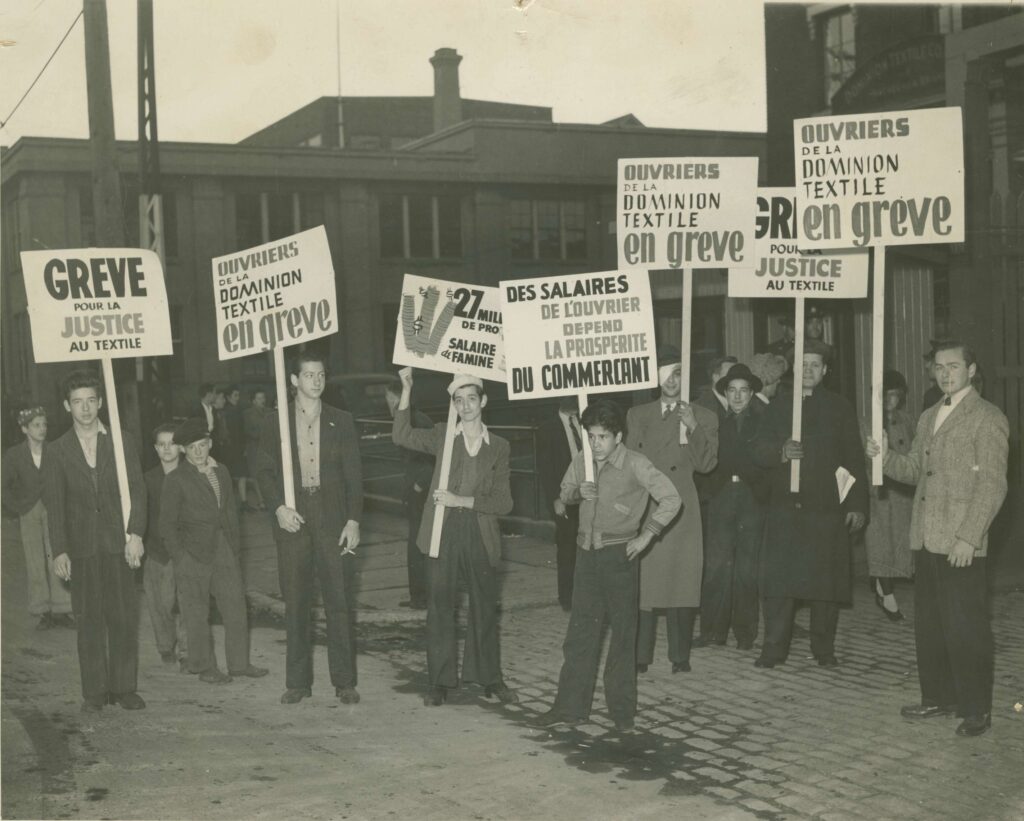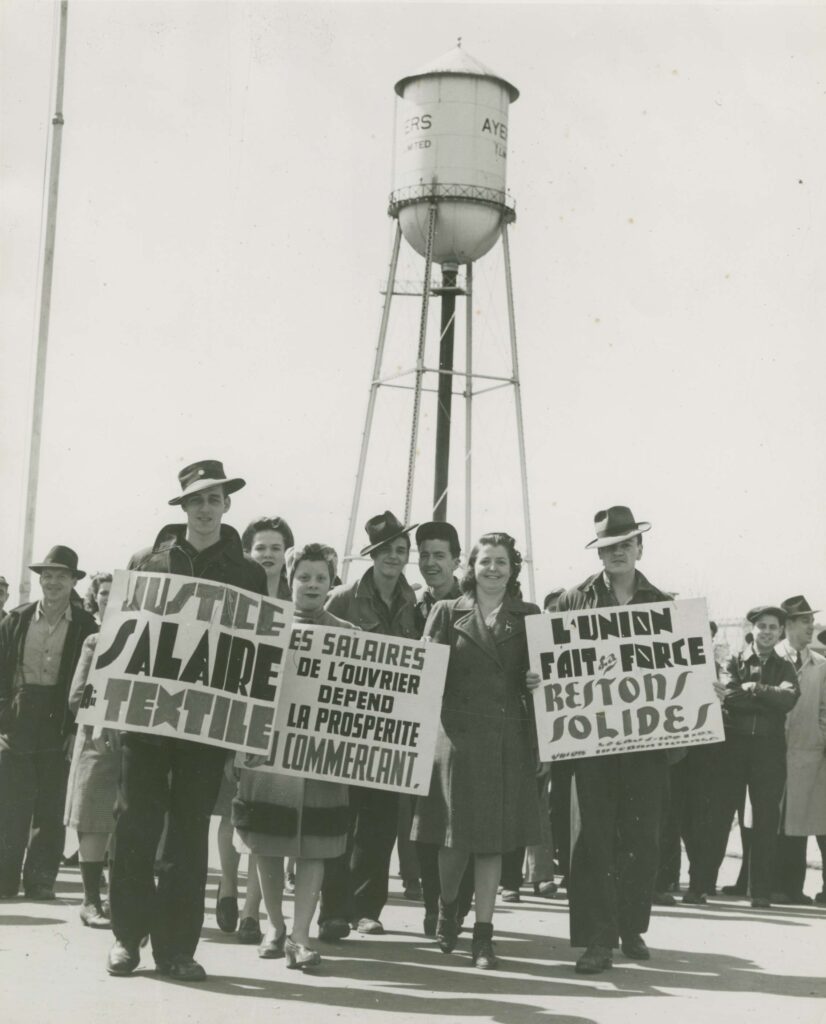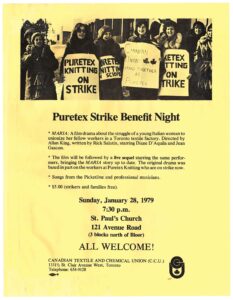The finding aid for the Madeleine Parent fonds is now available on McGill’s Archival Collections Catalogue. The fonds of the labour and social activist holds countless narratives, from Parent’s union work and writings to the history of Canadian unionism. Moreover, the fonds demonstrates Parent’s conviction that fighting for the rights of all marginalized people is integral to labour activism. She continued to advocate for this well after her retirement from union work in 1983.

It is difficult to select just one topic from this fonds to write on. One possible angle is to question what a finding aid does not do justice to. What could be useful for the researcher to know that archival descriptions don’t reflect? This can be a thankless task because there are countless perspectives. However, while processing this fonds, I came across a letter that inspired me. In a 1979 letter to Parent, Canadian historian Professor Desmond Morton wrote:
” … My own mother-in-law, who was active in the Stratford strike of 1933, apparently had a very large collection of photographs which she junked … Such losses occur with tragic frequency in labour circles and I spend a certain amount of time trying to dream up ways of creating historical awareness among union members … However, the real lack is the kind of “ephemera” generated by people in their struggles — home-made leaflets, cartoons, etc., which express feelings and emotional responses so much better than the work of gifted professionals.”
MG 4269/A5-001, McGill University Archives
There are two points that stood out to me: (1) “ephemera” and (2) expressions of feelings and emotional responses.
On Ephemera
In archival lingo, ephemera refers to stuff made for limited use to be discarded; think of the political campaign mail you receive during an election year. The research value of ephemera is often overlooked. Because of its perishable quality, complete sets of ephemera from which you can draw patterns or get a sense of a conversation are rare and often dispersed across different archives or collectors. Traditionally, ephemera gets a bad rap as an unofficial record; it is perceived as less important than written official statements, minutes of meetings, or correspondence. This is possibly why Morton wrote “ephemera” in quotations.

Ephemera, however, can be read from countless perspectives. It can provide insights into its intended audience and creator(s), material culture, and public discourse, which are not expressed in official records or media outlets. For instance, the Canadian Textile Council (CTC), a national trade union founded by Parent and Robert Kent Rowley, printed the first issue of their Bulletin as a flyer to update Dominion Textile Company workers on the progress of their 1952 strike. They express the reason for distributing the bulletin was due to the fact that the press and radio had stopped reporting on the strike.
The conversations that can be gleaned from the many flyers found in the Parent fonds are a treat. Flyers not only document strikes but also Canadian unionism and campaigns. For example, they document the campaign between the American-led United Textile Workers of America (UTWA) and the CTC. It’s a complex story, but the main point is Parent and Rowley used to work for the UTWA’s Canadian District and, frustrated by American leadership making decisions for Canadian workers, they spearheaded an independent Canadian union: the CTC. This of course meant that there was an option for UTWA members to change unions and vote to become members of the CTC. Hence the flyer wars began. Most of the flyers in the fonds are the ones distributed by the CTC, but Parent also kept some of the UTWA’s, giving us a sense of the back and forth between the unions battling for votes. Some of the campaign messaging also included personal attacks on labour organizers, including Parent and Rowley.

These flyers are a perfect example of the stories that live through ephemera. But, if we think of the spirit of Morton’s quote, these flyers were more an expression of the union leaders and less an expression of the general union membership (i.e. the workers). Of course, a union’s purpose is to represent its membership, so the flyers can provide insights into what workers were asking for, or in some cases their ethnic or linguistic backgrounds. For instance, CTC flyers were often printed in English, French, and Italian. Yet the flyers are not strictly speaking a direct expression of the workers.
On Expressions of feelings and emotional responses

There are several materials in the fonds that speak to the struggles of the workers. One such example includes files on grievances. However, as Morton points out, expressions of feelings and emotional responses of people in their struggles can be challenging to find in archives. Photographs are a great resource, and the Parent fonds contains images that document labour struggles in Quebec and Ontario, spanning the late 1940s to the 1970s. Interestingly, a lot of the photographs of the strikes capture some of the “ephemera” created by the workers. The signs held by workers on strike in 1947 at Ayers Woolen Mills in Lachute, Quebec and the workers posing during the 1978 yearlong Puretex Knitting Company strike, in Toronto, Ontario, are both examples of such “ephemera”. Some of the photographs also depict the police response striking workers faced. For instance, photographs of the Artistic Woodwork Company strike in 1973 show workers physically struggling with police trying to break up the strike.
Besides photographs, there are some examples of ephemera created by the workers facing these struggles. There are a few good examples in the Puretex Knitting Company Limited sub-series. The workers at Puretex, a garment factory in Toronto, Ontario, went on strike in 1978 to protest the installation of surveillance cameras on the factory floor and the washroom doors. Workers were mostly immigrant women from southern and eastern Europe paid about $3.60-$3.75 an hour facing harsh working conditions. Some of the ephemera in the fonds quite literally express their emotions about their wages and working environment. Here is an example of a flyer of songs they wrote:

Sifting through the materials you can also get a sense of the connections between some of the workers and their communities. For instance, a flyer for a Puretex Strike Benefit Night and photographs of a 1952 Labour Day parade in Valleyfield, Quebec, both document this. The Puretex Strike Benefit Night flyer is particularly interesting. It not only invited community members to support the strike but also framed the strike within a broader collective narrative about immigrant women, specifically Italian immigrant women, fighting for labour rights within the community.
The Parent fonds provides information into the life and career of Parent, but it also holds insights into the experiences of the people whose struggles Parent advocated for. This post provides only a sample of the stories living in the Parent fonds that go beyond the life and career of the labour activist herself.
Are you interested in learning more about the Madeleine Parent fonds or have questions about how to access these materials? Check out the finding aid in McGill’s Archival Collections Catalogue or reach out to us via email.














Very happy to see that the fonds is looked after. I left it with a strong sense that so much was still to be done! Bravo, Adria, for pointing to the fantastic collection of pamphlets and photos included in this fonds.
Geneviève